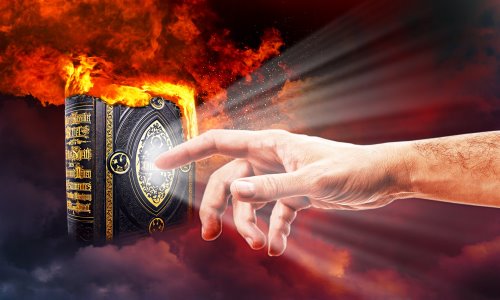
Acts 2:27
Because thou wilt not leave my soul in hell, neither wilt thou suffer thine Holy One to see corruption.
Few people realize that everyone who has been laid to rest in the cemetery, whether good, bad, great, or small, everyone has gone to hell. Contrary to popular opinion, the biblical concept of hell is not a place of conscious torment but is gravedom, the state of death. And those who have departed this life have no consciousness of anything. They are not experiencing soul sleep. They are dead and live only in the memory of God.
A favorite portion of Scripture used by fundamentalist believers today in support of the immortal soul theory is found in 2 Corinthians 5:1-8. And the favorite often-quoted phrase taken out of context is "absent from the body, present with the Lord." The thinking in support of this interpretation is based on the belief that man possesses a soul, a separate spirit entity residing within the body. From this chapter also, they can base the argument that man's mortality is restricted to the physical body and does not include his so-called immortal soul. When the believer's mortal body is dissolved in death, then complete immortality is achieved when the immortal soul is joined in union with an immortal body that God will provide in heaven. But one lie leads to the necessity of another lie to support the first lie. So theologians invented the intermediate state teaching. Since the soul departs from the body at death, it needs to be clothed with a temporary body of some kind so it can have a conscious function. Therefore they teach that the soul that departs to be with Christ in heaven receives a temporary body to reside in until the resurrection day, which takes place at the second coming of Christ. We do not wish to intimate that those who teach such things deliberately try to deceive people. No doubt, it is taught in blind ignorance. Just think of the spiritual blindness it inflicts on millions of believers! And the Glory of Christ and The Truth of His Resurrection Power suffer the most!
Beware lest any man spoil you through philosophy and vain deceit, after the tradition of men, after the rudiments of the world, and not after Christ (Colossians 2:8).
For that which befalleth the sons of men be-falleth beasts; even one thing befalleth them: as the one dieth, so dieth the other; yea, they all have one breath (spirit); so that a man hath no preeminence above a beast: for all is vanity. All go unto one place; all are of the dust, and all turn to dust again (Ecclesiastes 3:19-20).
Not only do all men go to the same place when they die, but the beasts also go there. There is no way to avoid this place. No difference how good a man or a beast may be or how bad, they all go to the same place at death.
Whatsoever thy hand findeth to do, do it with thy might; for there is no work, nor device, nor knowledge, nor wisdom, in the grave (hell), whither thou goest (Ecclesiastes 9:10).
If any man has a desire to escape from this place where all go, he will have to get busy and make his plans now in this life, for there will be no such opportunity after death. The place where men and beasts go at death is named here. There is no doubt about it, the Hebrew word is sheol and it is translated by grave, hell, pit, and other words. But it is always the same place.
My flesh also shall rest in hope. For Thou wilt not leave My soul in hell; neither wilt Thou suffer Thine Holy One to see corruption (Psalm 16:9-10).
This is speaking of Christ prophetically. He who took upon Himself the sin of the world died and went to the same place all of us, and also the beasts go at death. And He is the only one who has ever come out of that place, never to go back again. He is the firstfruits of them that slept. First fruits indicate a harvest that will follow.
As for me, I will behold Thy face in righteousness: I shall be satisfied, when I awake, with Thy likeness (Psalms 17:15).
Every believer should solemnly repeat these words. Coming out of the grave or hell in the Resurrection is an awakening from sleep. This figure is used over and over.
So man lieth down, and riseth not: till the heavens be no more, they shall not awake, nor be raised out of their sleep. O that Thou wouldest hide me in the grave, that Thou wouldest keep me secret, until Thy wrath be past, that Thou wouldest appoint me a set time, and remember me! If a man die, shall he live again? all the days of my appointed time will I wait, till my change come. Thou shalt call, and I will answer Thee (Job 14:12-15).
Job realizes that death is a lying down. Job hoped for a Resurrection for the new earth or paradise. He prayed to be hidden in hell or the grave till God's wrath was over. But he wanted God to set a time for his awakening and remember him. Job did not believe in the heathen concept of the soul, that it lived on and on. But the real question is whether a man will live again after death, not keep on living. Job expects a change someday, just as did Paul. And Job expects to answer when the Great Shepherd calls at The Great Resurrection morning.
How different this Bible Truth is from the superstitions of the heathen! They say that there are two places the dead go to, not one. And they say that there is consciousness in Sheol, the grave, or hell. They believe all this because they have no knowledge of salvation or resurrection.
So God says that not only do all people go to the same place when they die, but also the beast goes to the same place. Now if you would take your concordance and look up Sheol, grave, dust, and hades, you will be surprised to find them so closely related. For truth, go to the Word of God.
The heathen is much exercised as to how to keep from going to Sheol or hell. The Christian knows that he is going there but is prepared to escape from it, i.e., by Resurrection.
The heathen have the concept that man is immortal and will live on and on forever. So he has surmised that man has an endless future of either happiness or misery. But those who know God and His Word know that man is a soul and that souls die. They also know that as for the future, they either have life or they perish (John 3:16). That is, they either resurrect to life or to judgment. God has made the terms by which they can live.
The first occurrence of hell or Sheol in the Bible is Genesis 37:35. Jacob expected to go there when he died. Job prayed that he might be hidden in that place till God's wrath was passed (Job 14:13). And our Lord was there three days and three nights.
Almost 3500 years ago, Moses wrote the truth about The Hope of Resurrection. He made it plain that man lived (again) by believing God (Deuteronomy 8:3). This is still God's truth. It has not changed.
It is wise to look into this subject very carefully, for the Christian should have it clear about the difference between his hope and that of the heathen around him. And he must not believe that Plato was one of the church fathers and had the truth.
The abode of the dead in the Hebrews is known as SHEOL, translated as hell, grave, and pit. This is the common abode of both man and beast. But let us see. Here are a few passages;
Genesis 37:35. Jacob speaking. I will go down into the grave unto my son mourning.
He supposed Joseph to be dead and in hell. See Gen. 42:38.
Job 14:13. O that Thou wouldest hide me in the grave (hell).
Read the context, Job 14:12-15.
Job 18:5-18. Yea, the light of the wicked shall be put out, and the spark of his fire shall not shine...
Job 20:4-9. In this, you find that the wicked he shall perish forever like his own dung.
Job 21:17-21. Note that a candle is put out. They are as stubble. His eyes shall see his destruction. This is the fate of the wicked.
Psalm 2:9-12. This is a millennial scene. Even then, the wicked will perish.
Psalm 9:5. Thou hast destroyed the wicked, Thou hast put out their name forever and ever.
Psalm 11:6. Upon the wicked shall He rain snares, fire and brimstone, and an horrible tempest: this shall be the portion of their cup.
Psalm 34:16. The face of the Lord is against them that do evil, to cut off the remembrance of them from the earth.
Psalm 37:10. For yet a little while, and the wicked shall not be.
Psalm 37:20. But the wicked shall perish.
Psalm 37:35-38. I have seen the wicked in great power...yet he passed away, and, lo, he was not...but the transgressors shall be destroyed together.
Psalm 49:12, Psa. 49:20. Man that is in honour, and understandeth not, is like the beasts that perish.
Psalm 92:7, Psa. 92:9. When the wicked spring up as the grass, and when all the workers of iniquity do flourish: it is that they shall be destroyed for ever... For, Lo, Thine enemies shall perish.
Psalm 112:9-10. The desire (hope) of the wicked shall perish.
Proverbs 10:24-30. But the wicked shall not inhabit the earth.
Read the whole passage.
Proverbs 13:13-14. Whoso despiseth the word shall be destroyed...The law of the wise is a fountain of life, to depart from the snares of death.
Proverbs 14:12. There is a way which seemeth right unto a man...the end thereof the ways of death.
Proverbs 15:24. The way of life is above (upward) to the wise, that he may depart from hell (the grave) beneath.
Proverbs 21:16. The man that wandereth out of the way of understanding shall remain in the congregation of the dead.
Ezekiel 18:4: Behold, all souls are Mine; as the soul of the father, so also the soul of the son is Mine: the soul that sinneth, it shall die.
Ezekiel 18:32. For I have no pleasure in the death of him that dieth, saith the Lord God: wherefore turn yourselves, and live ye.
And so exhorts men to change their ways. See Eze. 18:29-31 preceding.
Ezekiel 18:27. Again, when the wicked man turneth away from his wickedness that he hath committed, and doeth that which is lawful and right, he shall save his soul alive.
The judges will not execute him for his sins here and now. And also, there is the promise of a future life upon the repentance of his evil ways.
Malachi 4:1. For, behold, the day cometh, that shall burn as an oven; and all the proud, yea, and all that do wickedly, shall be stubble: and the day that cometh shall burn them up, saith the Lord of hosts, that it shall leave them neither root nor branch.
This day is still future.
Much of the foregoing is rather gloomy. But there is a brighter side, a hope for those who will listen and believe.
John 3:3. Verily, verily, I say unto thee, Except a man be born again, he cannot see the kingdom of God.
Man is singular and refers to Nicodemus personally.
John 3:7. Marvel not that I said unto thee, Ye must be born again.
Ye is plural and refers to Israel, of whom Nicodemus was a ruler, member of the Sanhedrin.
John 3:16. For God so loved the world, that He gave His only begotten Son, that whosoever believeth in Him should not perish, but have everlasting life.
John 3:36. He that believeth on the Son hath everlasting life: and he that believeth not the Son shall not see life.




























